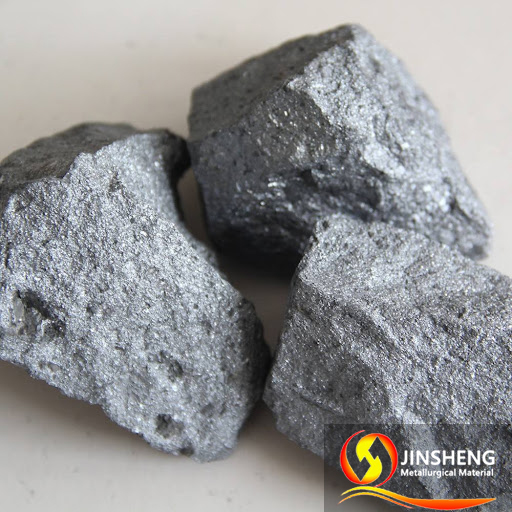Use of silicon calcium barium in steelmaking
2025-06-26
In the complex and sophisticated field of steelmaking, the quality and performance of steel products depend largely on the choice of additives. Among them, calcium barium silicate, as a kind of composite alloy additive, plays a multidimensional and vital role in modern steelmaking production. In this paper, we will discuss the various applications, unique advantages and important contributions of calcium barium silicate in steelmaking.

What is silicon calcium barium?
Calcium-silicon barium is a composite alloy with silicon, calcium and barium as its main components and a small amount of iron. This unique combination of elements gives it excellent properties, making it an ideal additive in the steelmaking process.
Unlike single-element additives, the multi-component nature of calcium-silicon barium enables it to realize multiple functions at the same time, greatly revolutionizing the steelmaking production process.
What are the actual uses of silicon calcium barium in steelmaking?
Deoxidation
Deoxidation is one of the most critical applications of calcium barium silicate in the steelmaking process. Oxygen in molten steel can cause various defects such as porosity and embrittlement, which seriously affect the final quality of steel. The silicon, calcium and barium elements in calcium-silicon barium can react with the oxygen in the molten steel to form stable oxides such as silicon dioxide (SiO_2), calcium oxide (CaO) and barium oxide (BaO).
These oxides are then removed in the form of slag, effectively reducing the oxygen content of the steel. Compared to traditional single-element deoxidizers, the deoxidizing effect of calcium silicon and barium is more comprehensive and efficient, ensuring that the steel achieves a higher degree of purity.
Sulfur and Phosphorus Removal
Sulfur and phosphorus are harmful elements in steel that can lead to quality problems such as hot embrittlement. Calcium silicon and barium have excellent desulfurization and dephosphorization capabilities. Calcium and barium in the alloy react with sulfur to form calcium sulfide (CaS) and barium sulfide (BaS), which are insoluble in steel and are discharged as slag; during dephosphorization, calcium barium silicate helps to form a stable phosphate, which can also be separated from the steel.
This makes calcium barium silicate an indispensable additive for the production of low-sulfur, low-phosphorus steels, meeting the demand for high-quality steel in many industries.
Inclusion Modification
Inclusions in steel, such as oxides and sulfides, can significantly affect the mechanical properties of steel. Calcium barium silicate plays a key role in inclusions modification, altering the form, size and distribution of inclusions.
It can transform harmful large-size angular inclusions into small-size spherical or granular ones, thus reducing the negative impact of inclusions on the strength, plasticity and toughness of steel, and significantly improving the overall quality and performance of steel.
Grain Refinement
The barium element in silica-calcium-barium has a significant effect on grain refinement. During the solidification process, barium acts as a nucleation core, inducing more nucleation and inhibiting grain growth. Ultimately, steel obtains a finer grain structure, which in turn improves its mechanical properties such as strength, impact resistance and fatigue life.
Alloying Agents
Silicon, calcium and barium are important alloying elements. Adding silicon, calcium and barium to steel allows for precise adjustment of the alloy composition. Silicon can improve the strength and hardness of steel; calcium can improve the processing performance and corrosion resistance of steel; barium helps to refine the grain and enhance the impact toughness. Therefore, silicon calcium barium has become an ideal alloying agent for the production of various steel grades from low alloy high-strength steel to stainless steel.
Advantages of silicon barium calcium in steelmaking
Excellent performance
Calcium barium silicate significantly improves the mechanical properties of steel, enabling the production of high-strength, high-hardness, wear-resistant and corrosion-resistant steels. The steel treated with calcium silicate maintains stable performance even in harsh environments, making it suitable for use in construction, automotive, aerospace and many other applications.
Good thermal stability and oxidation resistance
The alloy has good thermal stability and oxidation resistance, is not easily deformed at high temperatures, and is resistant to oxidation and corrosion. This allows steel produced with calcium barium silicate to be used under severe conditions such as high temperature, high pressure and strong corrosion.
Excellent processing performance
Calcium barium silicate has good processing performance and can be easily made into parts of various shapes and sizes through forging, casting and machining. During processing, it is not easy to appear cracks and deformation, which is convenient for the production of complex steel components.
Remarkable cost-effectiveness
Although calcium barium silicate may appear to be a specialty additive, its multifunctional properties make it cost-effective in the long run. By simultaneously providing deoxidation, desulfurization, and inclusions modification, it reduces the need for multiple additives, simplifies the steelmaking process, and ultimately lowers production costs.
Important application in special steel production
Calcium barium silicate occupies an important position in the production of special steel, which is widely used in the manufacture of rail steel, low carbon steel, stainless steel, and special alloys such as nickel-based alloy and titanium-based alloy. In the production of stainless steel, it helps to improve the corrosion resistance of steel and make the organization structure more uniform; in the production of rail steel, it can enhance the strength, wear resistance and fatigue life of rails to ensure the safety and durability of railroad transportation. In the field of special alloys, the application of calcium barium silicate can produce high-performance materials to meet the needs of high-tech industries.
Conclusion
Calcium barium silicate has become an indispensable additive in the steelmaking process. Its wide range of applications, numerous advantageous properties, and important role in steel quality improvement make it a key factor in the production of high-performance steel. With the continuous development of the steel industry and the growing demand for high-quality steel, calcium barium silicate will become more and more important in the field of steelmaking in the future.






